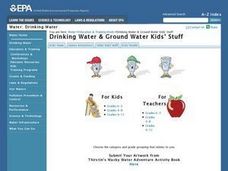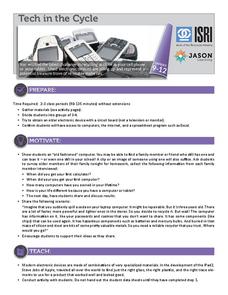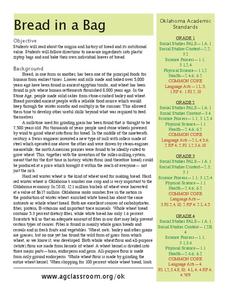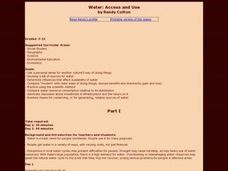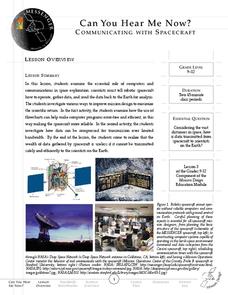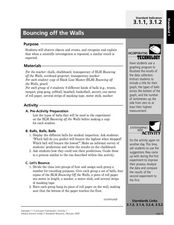Curated OER
Youth Activity: How People Get Their Water Reservoirs: "Holding Tanks" for Drinking Water
Students experience and participate in "Riding the Water Cycle" with this lesson. They explore, analyze and study the role of reservoirs in maintaining a reliable supply of drinking water. Each student constructs a model of a reservoir.
Carnegie Mellon University
How Power Plants Work 1
First of three lessons, this is a great start to a unit on energy. As you demonstrate, learners discover different types of energy and how it is converted from one form to another. They then focus in on the generation of electricity by...
Jason Learning
Tech in the Cycle
It might not be easy, but it is worth recycling electronics. Small groups determine the percentage of the materials that make up an iPad 2 and display the information in a circle graph. They then research the recycling process for...
Teach Engineering
Model Heart Valves
Small groups use the knowledge learned about the heart to design and build a prototype of an artificial heart valve. The teams demonstrate the functionality of their valve. They are also responsible for creating a pamphlet that describes...
Teach Engineering
Get the Word Out at McDonald's!
To get the word out that the Great Pacific garbage patch (GPGP) contains millions of pounds of non-biodegrading plastics, individuals research the GPGP and write an article for a newsletter. Researchers present their facts in a way that...
Teach Engineering
How Effective is Your Sunscreen?
Protect skin from UV radiation! Groups design and conduct an experiment to test the effectiveness of UV safety products. The groups collect the data from the experiment and prepare a lab report. In the second day of the activity,...
NASA
Erosion and Landslides
A professional-quality PowerPoint, which includes links to footage of actual landslides in action, opens this moving lesson. Viewers learn what conditions lead to erosion and land giving way. They simulate landslides with a variety of...
Curated OER
Volume Lab
How can we find volume if it a shape isn't easy to measure? Investigate methods for determining this as the volume of regular and irregular objects is explored in several stations. Learners discover that when the standard formula for...
Curated OER
Marvelous Manatees
Two groups consider whether or not the Florida manatee will become extinct during their lifetimes. They research manatee populations and statistics together and then a class debate is held. Afterwards they consider how reliable their...
Curated OER
Experiment to Mimic the Digestive System
Biology lab technicians take a cheese sandwich apart as a demonstration of digestion. They record appearance and mass both before and after the process, which mimics chewing, acid action, and churning. Learners write their own lab...
Curated OER
ABO Blood Types Worksheet
Blood types and transfusions are explained in reading passages at the top of the worksheet. A chart of blood type compatibility is also provided. Biology students answer comprehension questions and then exercise critical-thinking skills...
Curated OER
Extraordinary Extrapolation
Students study how scientists have estimated the maximum height to which trees can grow, and assess the reliability of interpolation and extrapolation techniques by making predictions with particular data sets and analyzing accuracy of...
Curated OER
Bread in a Bag
Students explore wheat. In this bread making instructional activity, students make their own loaf of bread and discover the history behind wheat. They work in pairs to follow step-by-step instructions for making the bread. This...
Curated OER
Fact or Fiction? Urban Legends and Misconceptions
High schoolers are introduced to a process for using web site resources to verify the accuracy of biology information. They follow a guided lesson on evaluating web sites and determining content accuracy. They select a piece of unusual...
Curated OER
Water: Access and Use
Young scholars get a personal sense for another culture's way of doing things. Develop a list of sources for water. Practice using the scientific method. Examine means for conserving, or for generating, reliable sources of water.
Curated OER
Field Work
Students realize that everyone lives in a watershed and that water is a fundamental life sustaining resource, they investigate ways to look at surface streams for quantity and quality of this vital resources. Students construct a...
Messenger Education
Can You Hear Me Now?—Communicating with Spacecraft
Radio signals transmitted to Pluto take five hours to reach their destination! In these two activities, young scientists explore data communication in space. In activity one, pupils learn how data is gathered and sent back to Earth....
NOAA
Ground-truthing Satellite Imagery with Drifting Buoy Data
Ground-truthing ... is it even a word? The last installment of a five-part series analyzes how scientists collect sea surface temperature data. Scholars use government websites to compare temperature data collected directly from buoys...
Curated OER
Sharkland Wiki
Young scholars, while researching the waters around southern Africa and viewing a video of the episode "Sharkland" from Thirteen's series NATURE, critique reliability of online resources and analyze the various components of a wiki. They...
American Chemical Society
Curious Crystals
Crystals are more than meets the eye! Can learners tell them apart simply by observation? As they examine five samples with a magnifier, they find that appearance alone is not enough. This serves as an introduction to a mini unit on...
American Chemical Society
Color Changes with Acids and Bases
Getting back to the beginning of the unit, learners use reactions with red cabbage juice to determine if solutions are acidic, neutral, or basic. This is a straightforward and classic investigation, but what you will appreciate is the...
Curated OER
Light Your Way
Students investigate how a simple series circuit functions. They design and construct a working portable flashlight, develop a written plan for the flashlight, test their flashlight for functionality and reliability, and draw the series...
Curated OER
Bouncing off the Walls
Third graders compare the bouncing height of different types of balls. In this science activity, 3rd graders explain the importance of repeated experimentation in science. They record their result and share them with the class.
Carnegie Mellon University
How Power Plants Work 2
In this second of three lessons on power plants, future engineers find out how we generate electricity and how coal-powered plants operate. They work in small groups to make electromagnet generators to light LED bulbs. A set of...


